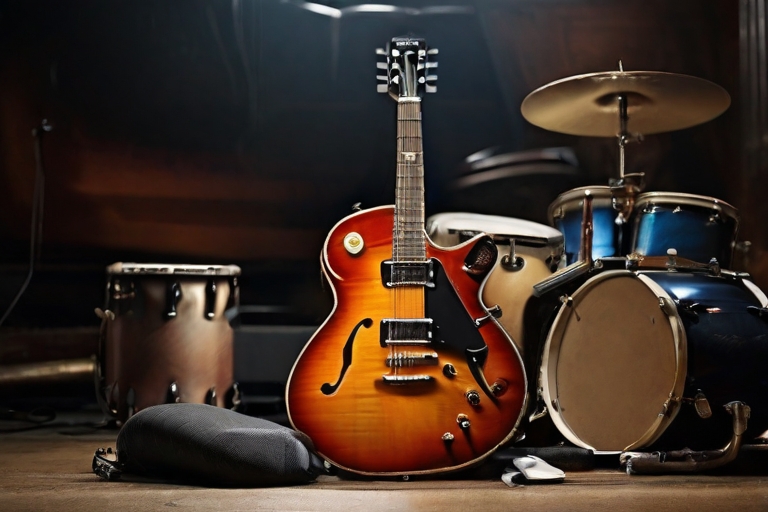
The Melody of Great Success: Harmonizing Music Education with Benefits
Table of Contents
From the haunting chants of ancient Greece to the electrifying beats of modern pop, music has resonated across cultures and centuries, shaping identities and enriching lives. This profound impact extends far beyond mere entertainment, for music education weaves a melody of success, nurturing well-rounded individuals and leaving a lasting positive imprint on society. Yet, despite its historical and cultural significance, music education faces a discordant reality – funding cuts, unequal access, and outdated policies threaten to silence the potential of countless young voices. This article aims not only to celebrate the potent benefits of music education but also to sound the alarm, urging stakeholders to invest in equitable programs that unleash the full potential of every child.

Music Education: The Orchestra of Cognitive Enhancement
Music unlocks a symphony of cognitive abilities. Studies reveal a robust correlation between music education and improved academic performance, particularly in math and reading. The rhythmic structure and intricate patterns of music hone spatial reasoning and auditory processing skills, while ensemble playing strengthens focus and memory retention. Imagine a young percussionist, coordinating limbs to strike complex rhythms – a testament to the precision and cognitive control nurtured by music.
Beyond technical prowess, music education cultivates critical thinking and problem-solving skills. Improvisational exercises, like crafting a melody on the spot, demand creative thinking and quick decision-making, skills that resonate across academic disciplines and real-world challenges. As Dr. Anita Collins, a renowned music educator, aptly states, “Music is a universal language that teaches children how to think, not just what to think.”
If you have developed an interest in Music after reading about the benefits of musical education feel free to begin with our excellent free videos giving you the basics on how to understand your musical journey!
Music Education: The Chorus of Social and Emotional Well-being
Music education isn’t just about individual notes; it’s about weaving harmony within ourselves and in our communities. Research shows that music participation reduces aggression and fosters positive social interaction. Singing in a choir or playing in a band teaches teamwork, empathy, and communication, creating a nurturing environment where diverse voices blend into a beautiful collective sound. Studies even suggest that exposure to different musical styles fosters cultural understanding and breaks down barriers, reminding us that music transcends language and speaks a universal language of emotion and connection.
Music Education: The Rhythm of Behavioural Excellence
The discipline required to master an instrument cultivates valuable life skills. Overcoming challenges, practising diligently, and persevering through frustration are valuable lessons learned through music. As a young violinist meticulously scales the fingerboard, she not only conquers a technical challenge but also builds self-discipline, focus, and resilience – qualities that resonate far beyond the concert hall. Research by the American Psychological Association confirms that music education leads to increased self-esteem, self-confidence, and emotional regulation, essential ingredients for navigating the complexities of life.

Music Education: The Song of Long-Term Success
The melody of music education echoes throughout a lifetime. Studies indicate that individuals with music backgrounds enjoy higher earning potential, often exceeding their non-musical counterparts by 15-25%. This advantage stems not only from increased academic achievement but also from the development of transferable skills like creativity, collaboration, and communication, highly sought after in diverse fields. As Quincy Jones, a music titan, proclaims, “Music education opens doors and allows you to have a different level of self-expression.”
The benefits extend beyond the realm of careers, enriching lives with cultural awareness and a lifelong appreciation for the arts. Imagine an individual raised on classical music discovering the soulful rhythms of gospel, or a hip-hop enthusiast delving into the intricate melodies of traditional Indian music. Music education broadens horizons and fosters a sense of global citizenship, reminding us that we are connected through the universal language of music.

Music Education: The Harmony of Health and Well-being
The benefits of music extend beyond the mind and touch the very fabric of our being. Engaging in music enhances motor skills and coordination, offering physical benefits akin to dance or sports. Research by the University of California, Irvine, reveals music’s positive impact on brain development and cognitive function, suggesting its potential to combat conditions like depression and dementia. In essence, music becomes a balm for the soul, promoting a sense of well-being and enriching lives at every stage.
If you are now thinking that you may want to pick up an instrument feel free to take a look at this article on the best instruments to pick up!
Music Education: A Global Symphony of Change
The need for equitable access to music education extends beyond national borders. Inspiring initiatives like Venezuela’s El Sistema showcase the transformative power of music in disadvantaged communities, providing not just instruments but also hope and opportunity. Young Venezuelans, armed with violins and cellos, rise above poverty and violence, their musical journeys mirroring a collective ascent towards a brighter future. This ripple effect extends to refugee camps in Kenya, where music lessons offer solace and resilience to displaced children, and war-torn villages in Syria, where community choirs rebuild bridges of understanding through shared harmonies.
These success stories are testaments to the transformative potential of music education, urging us to amplify its melody across the globe. We must advocate for policies that prioritize music in international development programs, ensuring that every child, regardless of background, has the opportunity to discover their unique musical voice.

The Final Cadence and Call to Action
The final notes of this symphony belong not to the orchestra on stage, but to us, the audience. Music education’s challenges – funding shortages, unequal access, and outdated policies – threaten to mute the potential of countless young voices. It is time for a resounding call to action.
To policymakers, we urge increased investment and equitable resource allocation. Let every school become a concert hall, where every child has the chance to discover the magic of music. To educators, we offer our unwavering support and collaboration. Let us work together to create innovative curricula and champion the power of music in education. To parents and community members, we ask for your advocacy and engagement. Join us in raising our voices to ensure that music continues to play a vital role in shaping the lives of future generations.
This collective effort is the crescendo we need to ensure that every child has the opportunity to discover their unique musical voice and contribute to the rich tapestry of our world. Let us raise our voices together, harmonize our efforts, and ensure that the music of education plays on, enriching lives and building a brighter future for all.
If you have enjoyed this blog post be sure to check out some of our other insightful articles at LearningMole! If you are further interested in Educational content be sure to check out our post about Educational statistics!


Leave a Reply